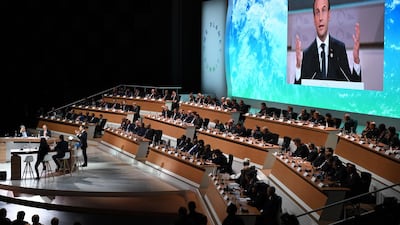The World Bank said on Wednesday it would stop providing financing to oil and gas projects after 2019, a move that analysts said may speed up the momentum towards clean energy investments by large global financial institutions.
The Washington-headquartered lender, whose current spending on energy accounts for 1 per cent of its annual budget, said it would channel 28 per cent of its lending to climate action by 2020. The announcement was made at the One Planet conference in Paris, convened by French president Emmanuel Macron, UN secretary general Antonio Guterres, and World Bank group president Jim Yong Kim.
The move follows similar initiatives by large financial institutions such as the US$1 trillion Norwegian sovereign wealth fund - the world's largest - which, in November said that it would sell all of its shares in oil and gas companies.
The global sentiment towards oil and gas investment is increasingly turning negative with large funds continuing to move away from fossil fuels. Even the large oil-producing nations such as Saudi Arabia are accelerating renewable energy programmes and phasing out subsidies.
"There is no doubt that, on balance, the global sentiment is increasingly hostile towards oil and gas, and the World Bank's announcement adds to it," said Carole Nakhle, chief executive of London-based energy advisory firm Crystol Energy. "However, until truly competitive alternatives are developed, the world will continue to see the dominance of fossil fuels in its primary energy mix for the foreseeable future."
_____________
Read more:
Clean power will cost India in more ways than one
Macron burnishes credentials as leader in fight against global warming
_____________
Mohamed Ramady, professor at Dhahran-based King Fahd University of Petroleum and Minerals, said that the announcement will serve as a "wake up call" for producers in the Arabian Gulf to cut reliance on oil.
"It's part of a trend when you see oil producers like Norway readjusting their investments in oil and gas," he said, adding that investment hedge and ethical funds will continue to invest in clean energy and gas. "This will encourage the step towards reforms in Saudi Arabia and the UAE which are looking at nuclear energy and renewables."
The World Bank's energy portfolio has been spent on helping communities living off-grid in energy poor nations to get access to power. Around 1.06 billion people worldwide live in energy poverty with no access to electricity, while another three billion subsist on polluting and hazardous fuels such as wood, charcoal, coal and dung for heating and cooking purposes, according to the bank.
However, despite being a net oil exporting region, countries in the Middle East and North Africa such as Egypt and Yemen have populations suffering acute energy deficiency . Others, such as Lebanon, have felt the strain of huge energy import bills squeezing their budgets.
The World Bank has supported access to electricity in these countries by dispensing loans. On Monday, the bank signed a $1.15bn financing agreement with Egypt, which among other things supports energy security in the most populous Arab nation . Egypt hopes offshore gas discoveries in the Mediterranean will transform it into a net exporter of the fuel.
Mr Ramady said that the bank's phase-out will bite the energy poor nations the hardest.
, The World Bank however said that it would make exceptions.
"Consideration will be given to financing upstream gas in the poorest countries where there is a clear benefit in terms of energy access for the poor and the project fits within the countries’ Paris Agreement commitments," it said in a statement.
The Paris Agreement is a global climate accord reached two years ago by around 200 countries that promised to limit global warming to 2 degrees or less by 2100 through lower carbon dioxide and other emissions.
The bank did not respond to emailed questions on its current and future spending targets for tackling energy poverty.


